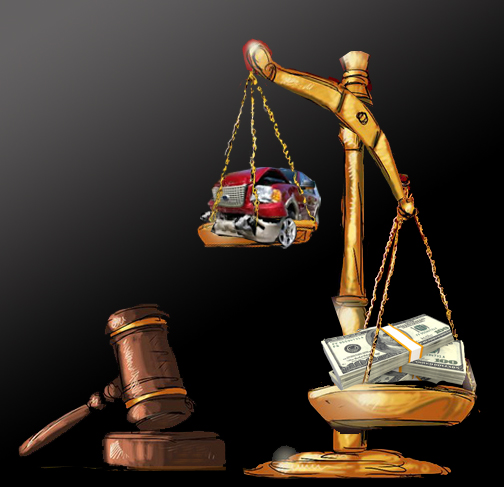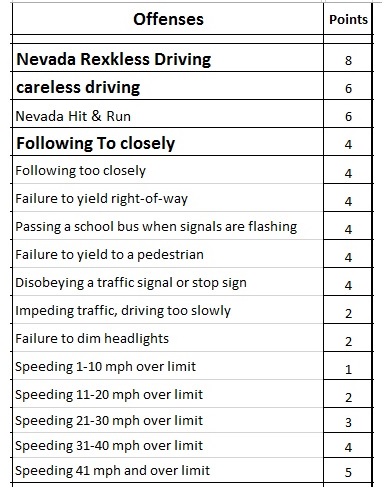9a – Laws & Penalties
DRIVING RECORDS
In Nevada, getting a driver’s license is a privilege. Once you have your license, you need to continue to drive safely, obey the rules and respect the rights of other drivers. If you do not, your license may be suspended, revoked, or canceled.
Information about traffic accidents and convictions becomes part of your driving record. Even traffic violations that occur in other states are added to your Nevada driving record.
Most violations are reported to your insurance company for 3 years.
Convictions related to DUI (Driving Under the Influence) stay on your record for 7 years.
Convictions related to DUI
DUI (Driving Under the Influence) stay on your record for 7 years.

Demerit Point System
The DMV uses a demerit point system as part of its driver improvement program. All traffic law violations are assigned a point value. When the DMV receives a conviction notice from a court, the offense is entered on your driver’s record, and points are assigned.
Demerit points are counted during a 12-month period.
• If you receive 12 or more points in any 12-month period, your license will be suspended.
• If you have accumulated between 3 and 11 points, you may have 3 points removed by completing a traffic safety course at a school approved by the DMV. You may attend traffic school only once in a 12-month period to remove points from your record.
• Attending traffic safety school removes a maximum of 3 demerit points. Points will be removed when the school reports completion for credit. However, the record of the conviction remains part of your driving history.
NOTE ON MAJOR TRAFFIC OFFENSES
.A conviction of a major traffic offense, such as a DUI or causing substantial bodily harm, will result in your license being revoked. These offenses are not assigned demerit points.
Moving Violations and Points in Nevada
When assessing moving violation points in Nevada, the state DMV calculates the number of penalty points based on the seriousness of the committed violation. Also, not all offenses result in infraction points. For example, instead of
accumulating DUI points in NV for driving under the influence offenses, motorists are penalized with immediate license revocation.
Several NV demerit point penalties issued in response to different types of offenses are outlined in the following list.
Note: The number of speeding ticket points assigned after a violation of the state speeding laws varies based on how fast the driver was operating his or her vehicle over the posted limit.


Per the rules of the Nevada DMV point system, the accumulation of 12 or more points within a one-year period leads to a suspension of your driver’s license. Moving violation points lose their point value 12 months after they were recorded on your driver’s transcript. Also, note that commercial drivers may receive a larger amount of points for the same offense than regular drivers.
Penalties in Nevada
Drivers may incur different traffic violation penalties in Nevada when they commit a traffic violation within the state. The administrative traffic ticket penalty issued by the DMV is often dispensed in addition to a court-imposed sentence. For example, while minor traffic violations generally incur traffic fine, more serious offenses will also result in severe criminal penalties administered by the presiding court. The NV DUI penalties issued for a first driving under the influence offense, for example, may include any combination of the following:
- An administrative suspension of 90 days.
- A fine ranging from $400 to $1,000.
- A court-ordered credential revocation of 90 days.
- A jail sentence of 2 to 180 days or a 96-hour community service sentence.
- A mandatory participation in a DUI school.
- An obligatory enrollment in an alcohol treatment program
Note: More severe drunk driving penalties in NV are administered to drivers who were already convicted of a DUI offense within the last seven years.
The following is a partial list of traffic violations and demerit points that can be assigned to your driving record:
SPEEDING;
To easily remember these numbers:
the number of points is one over the 10th. For example if it is:
over 10 = 2 points
over 20 = 3 points
over 30=4 points
over 40 = 5 points.
excepted the first level, 1 to 10 =1
1-10 mph over posted limit…………………… 1
11 to 20 mph over posted limit……………2
Prima Facie speed violation or driving too fast for the conditions……………………………………………….2.
21-30 mph over posted limit………………………..3
31-40 mph or more over posted limit………..4
41 mph or more over the posted speed limi..5.
Impeding traffic, driving too slowly……………….. 2
Failure to dim headlights…………………. 2
Following too closely………………….. 4
Failure to yield right-of-way………………4
Failure to yield to a pedestrian……………. 4
Disobeying traffic signal or stop sign……………..4
Careless driving……………….. 6
Failure to give information or render aid at the scene of an accident………..6
Reckless driving…………….. 8
Note:
If you have a Commercial Driver’s License, there are additional penalties for some traffic violations, and additional demerit points may be assigned.
It is against the law to give false information when applying for your Nevada Driver’s License. It is also illegal to alter your license in any way, lend it to someone else, or use another person’s license.
The DMV will notify you if your license status is in jeopardy due to unsafe driving habits.
You may lose your Nevada driving privileges and your license under certain circumstances.
Licenses are not automatically reinstated following suspension or revocation.
You must:
- Reapply at a DMV office.
- Present the documents required for Evidence of Name, Date of Birth, and Social Security Number as listed in Chapter 1 of this manual.
- Meet any other reinstatement requirements.
- Pay the required reinstatement fees
Examples of driver’s license suspensions and revocations are listed below. License issuance may be delayed for some juvenile offenses.
- Point Suspension: When you accumulate 12 or more demerit points against your license in a 12-month period.
- Driving Under the Influence: If breath, blood, or urine tests reveal you are driving under the influence of drugs or alcohol or if you are convicted of a DUI.
- Collision with a Bicyclist or Pedestrian: If you cause a collision with a person riding a bicycle or a pedestrian.
- Failure to Appear: If you receive a traffic ticket and do not pay the fine on time or fail to appear as required.
- Security Deposit: If an accident occurs with more than $750 in damage (personal injury or property damage) and you do not have liability insurance, your driver’s license and vehicle registration plates are suspended.
- Failure to Maintain Insurance:
—— If you are required to provide proof of financial responsibility because of a license suspension or revocation and do not do so.
—— If you are cited by law enforcement and convicted of failure to maintain insurance.
—— If you have repeated lapses in vehicle liability coverage. - Child Support: If you are in arrears in court-ordered child support payments.
- Graffiti: If you are found guilty of a graffiti violation.
- Firearms: If a juvenile is found guilty of certain offenses related to firearms.
- Street Racing: If you are found guilty of participating in or organizing an unauthorized speed contest on a public highway.
- Alcohol and Drugs: If a juvenile is found guilty of buying, drinking, or possessing alcohol or using, possessing, selling, or distributing any controlled substance.
Top 10 driving laws people break without knowing
24 DMV Road test tips you need to now.
End of Topic 9a LAWS & PENALTIES – NEXT STEP: QUIZ # 9
